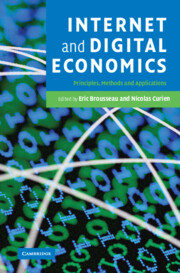Book contents
- Frontmatter
- Contents
- List of figures
- List of tables
- Notes on contributors
- Acknowledgements
- 1 Internet economics, digital economics
- Part I Toward a new economy?
- 2 Evolution of the new economy business model
- 3 Discourse on the new economy – passing fad or mobilizing ideology?
- 4 The Internet boom in a corporate finance retrospective
- Part II On-line communities
- Part III Network externalities and market microstructures
- Part IV Producing, distributing and sharing information goods
- Part V How e-markets perform
- Part VI Evolving institutional infrastructures
- Part VII The impacts of the Internet at the macro level
- References
- Index
3 - Discourse on the new economy – passing fad or mobilizing ideology?
from Part I - Toward a new economy?
Published online by Cambridge University Press: 22 September 2009
- Frontmatter
- Contents
- List of figures
- List of tables
- Notes on contributors
- Acknowledgements
- 1 Internet economics, digital economics
- Part I Toward a new economy?
- 2 Evolution of the new economy business model
- 3 Discourse on the new economy – passing fad or mobilizing ideology?
- 4 The Internet boom in a corporate finance retrospective
- Part II On-line communities
- Part III Network externalities and market microstructures
- Part IV Producing, distributing and sharing information goods
- Part V How e-markets perform
- Part VI Evolving institutional infrastructures
- Part VII The impacts of the Internet at the macro level
- References
- Index
Summary
Economists often refer to the impact of technological innovation on business, questioning changes in the balance between capital and labor, and the effects on growth. But until now no one had imagined that a new technology could radically change the very principles of economic activity. In this respect discourse on the new economy is a departure from traditional reflection on new technologies.
To understand the beginnings of this new economic discourse we need to remember that for a long time the Internet was free; it lay outside the market economy. For nearly two decades this free access was taken for granted. Since the network was an academic research project, it stood to reason that its products would be freely available. In the 1980s those computer scientists who were immersed in the academic tradition of free access and sharing were the first to theorize the principles of cooperation and sharing in which the Internet is grounded. Their reflection constituted the underpinnings of the open-source software utopia.
In the early 1990s an important change was witnessed when the Internet progressively became a commercial network. New Internauts, unlike the founding fathers of the Internet, had the idea of doing business on the network. They considered the Internet to be a medium like any other and saw no reason not to use it for advertising and trade. A head-on collision thus appeared between the two points of view: free access and even free sharing versus payment and commerce.
- Type
- Chapter
- Information
- Internet and Digital EconomicsPrinciples, Methods and Applications, pp. 114 - 141Publisher: Cambridge University PressPrint publication year: 2007



